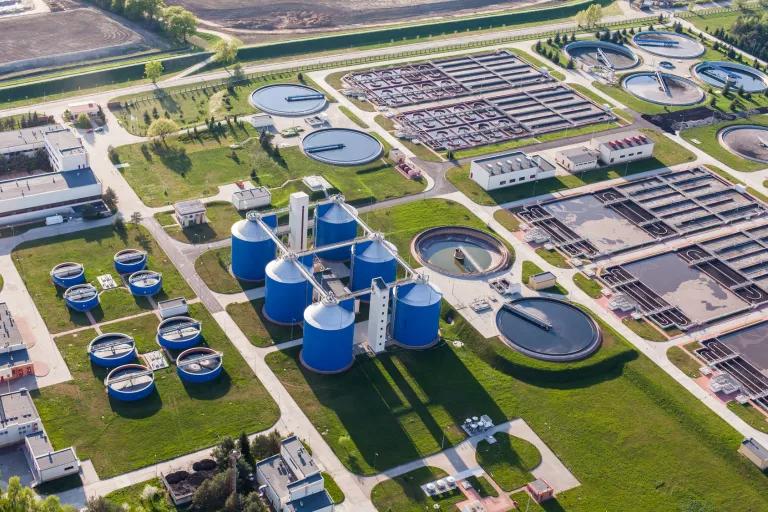House OKs a Serious Investment in Protecting Our Water!
The House of Representatives’ passage of the Moving Forward Act (H.R. 2) is good news for our nation’s water infrastructure.

Image credit: U.S. Department of Agriculture
The U.S. House of Representatives’ passage of the Moving Forward Act (H.R. 2) is good news for our nation’s water infrastructure—especially in economically disadvantaged areas and communities dealing with lead-contaminated drinking water.
America’s failing water infrastructure
We depend on water infrastructure every day: to bring us safe water to drink, to protect our communities from flooding, and to keep local rivers and lakes clean and safe for our families to enjoy. However, in many areas across the country, that infrastructure is failing us.
Pipes, septic tanks, and treatment facilities have outlived their intended lifespans and are breaking down, with the most severe impacts often falling on low-income communities and communities of color. The American Society of Civil Engineers gave the nation’s drinking water infrastructure a D grade and wastewater infrastructure a D+ grade in its 2017 infrastructure report card. Critically, climate change is adding further stress to these systems.
The EPA estimates that we need to invest $743 billion in maintaining and repairing our wastewater infrastructure over the next twenty years just to meet current environmental and health standards ($472 billion for drinking water and $271 billion for wastewater and stormwater). Yet according to Congressional Budget Office data, federal funding for water and wastewater utilities has decreased fourfold since 1980, leaving state and local governments to pick up the tab.
These costs are becoming increasingly difficult for communities to afford. The passing on of infrastructure repair costs to consumers has created an affordability crisis for many low-income people across the country with water and wastewater prices more than doubling over the last twenty years.
Infrastructure investment’s economic benefits
The good news is that investing in water infrastructure has huge benefits for our communities beyond cleaner water, as highlighted by two new reports released this week.
BlueGreen Alliance’s report Water Works: The Job Creation Potential of Repairing America’s Water Infrastructure finds that investments in the nation’s water systems to improve them to a “B” grade would create 654,000 job-years—a job that employs a person full-time for one year—across the U.S. economy.
And American Rivers’ report Rivers as Economic Engines: Investing in Clean Water, Communities and our Future advocates for closing the water infrastructure funding gap because doing so will add over $220 billion to the economy every year.
The Moving Forward Act
The Moving Forward Act includes several important provisions that invest in our nation’s water infrastructure.

Image credit: Florida Department of Environmental Protection
First, the bill increases authorized funding levels for both drinking water and wastewater infrastructure. It would significantly increase the amount of federal assistance made available to states and communities through the Clean Water State Revolving Fund (CWSRF). The bill’s CWSRF authorization of $8 billion annually would quadruple current funding levels and help to make progress on our nation’s substantial water infrastructure backlog. By spurring development of good union jobs, including expanded job opportunities in environmental justice communities, this investment would also boost local economies that have been hit hardest by the COVID-19 pandemic.
The bill also reauthorizes the Drinking Water State Revolving Fund at increased levels (ramping up to $5.5 billion per year). An additional important provision provides $500 million per year in direct assistance to disadvantaged communities and communities suffering from contamination with “forever toxic chemicals” called PFAS (per- and polyfluoroalkyl substances) (see Erik’s blog on this problem here).
Critically, an amendment authored by Michigan Representatives Rashida Tlaib, Dan Kildee and Elissa Slotkin, joined by Reps. David Cicilline (RI) and Gwen Moore (WI), added to the bill will also provide an additional $4.5 billion per year for five years to replace lead service lines across the country. It prioritizes funding for low-income communities and environmental justice communities already facing substantial environmental burdens.
These provisions would help eliminate water inequalities, spur economic recovery and growth, and build strong, resilient communities. The legislation also requires that jobs created by these measures must pay a living wage so workers can support themselves and their families. In future legislation, we hope to see even higher authorization along with policies improving the affordability of water service for low-income households and economically disadvantaged communities.
The bill also contains provisions that make federal funding easier to access and more effective for frontline communities. Federal funding for infrastructure has historically not translated to increased support for the frontline communities harmed most by environmental pollution. The Moving Forward Act will help ensure funding goes where it is needed by establishing a requirement for states to direct a certain percentage of infrastructure funding to disadvantaged communities.
It also includes provisions related to workforce development in the water sector; grants for sewage pollution reduction and wastewater system climate resilience; technical assistance for small, rural, and tribal communities; and funding for beneficial green infrastructure projects.
Finally, the bill reauthorizes or establishes programs that help restore and protect our nation’s great waters, including the Chesapeake Bay, Great Lakes, and National Estuary Programs. These programs will help to restore fish and wildlife habitat, improve water quality, and safeguard drinking water sources.
Thanks to these forward-looking components of the Moving Forward Act, this bill is a vital step towards addressing the urgent need to protect our water while creating many jobs that pay a living wage. The next step is for the Senate to move forward with similar reforms (some of which have already been included in a Senate Environment and Public Works Committee-passed package of water legislation). And ultimately, Congress will have to appropriate money to fund the authorizations in this legislation—that’s where “the rubber meets the road.”
These important steps are crucial to achieving our shared goal of ensuring clean, safe, and affordable water for all.




